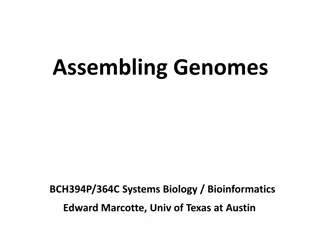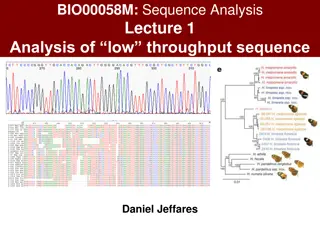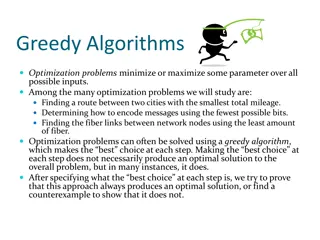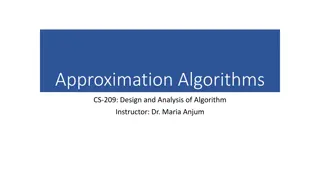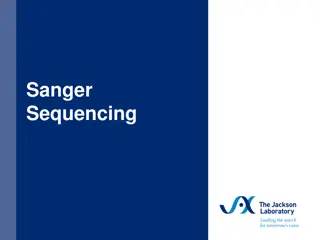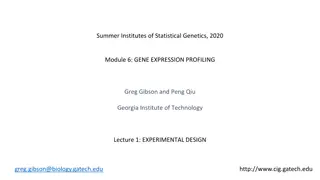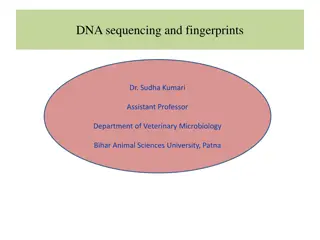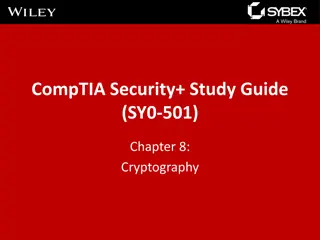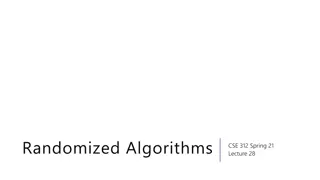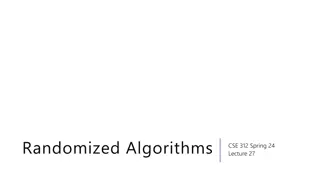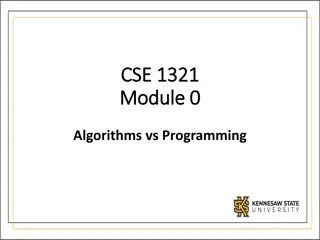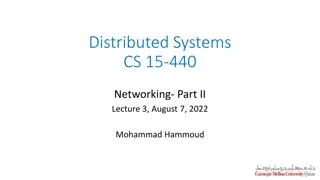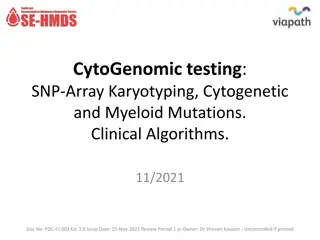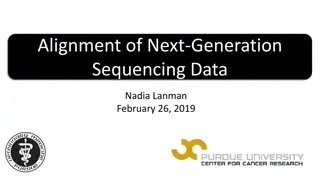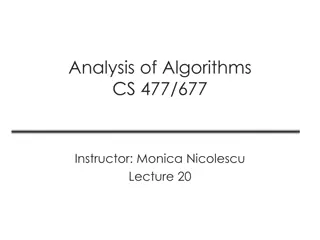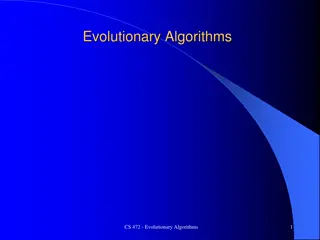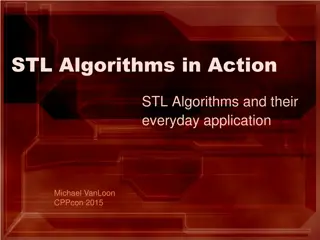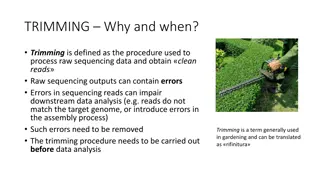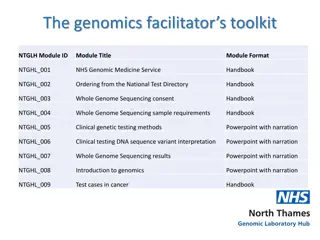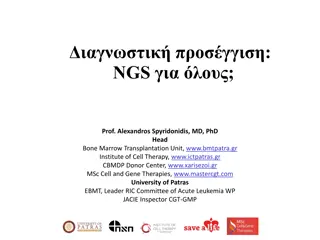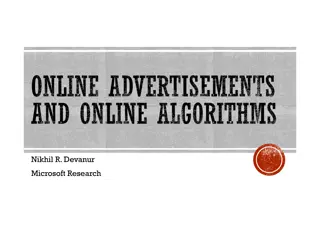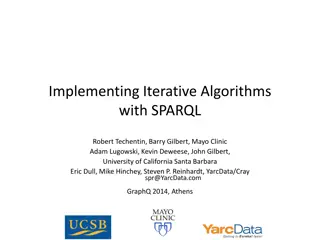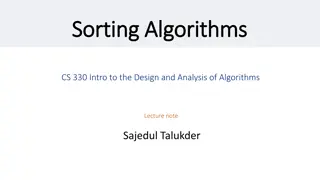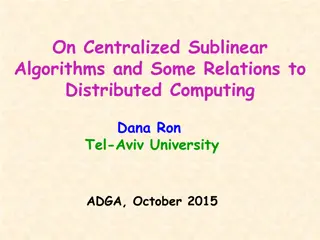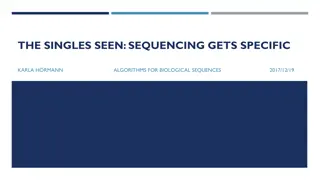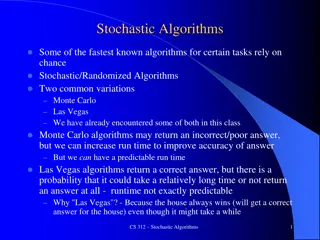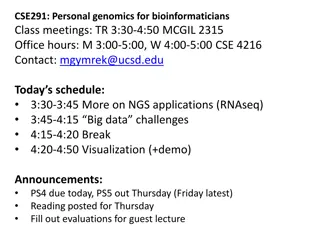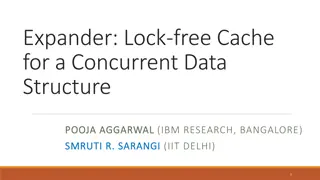Insights into Genome Assembly and Shotgun Sequencing
Explore the world of genome assembly, shotgun sequencing, and the fundamental concepts behind deriving genomes from large sets of sequencing reads. Learn about the complexity and core algorithms involved in contemporary genome assembly processes. Discover how the shotgun concept has revolutionized g
2 views • 66 slides
Understanding Algorithms and Programming Fundamentals
Learn about algorithms, programming, and abstraction in computing. Explore the definition and properties of algorithms, the relationship between algorithms and programming, and the concept of abstraction. Discover how algorithms are like recipes and how abstraction simplifies complex tasks in comput
1 views • 17 slides
Transformative Power of Sequencing in Molecular Biology
The falling costs of sequencing have revolutionized various fields like genetics, genomics, cell biology, microbiology, and evolutionary biology. Sequencing data has enabled us to understand genomes, revolutionize cell biology techniques, conduct comparative genomics, population genomics, and metage
1 views • 31 slides
Greedy Algorithms in Optimization Problems
Greedy algorithms are efficient approaches for solving optimization problems by making the best choice at each step. This method is applied in various scenarios such as finding optimal routes, encoding messages, and minimizing resource usage. One example is the Greedy Change-Making Algorithm for mak
0 views • 12 slides
Near-Optimal Quantum Algorithms for String Problems - Summary and Insights
Near-Optimal Quantum Algorithms for String Problems by Ce Jin and Shyan Akmal presents groundbreaking research on string problem solutions using quantum algorithms. The study delves into various key topics such as Combinatorial Pattern Matching, Basic String Problems, Quantum Black-box Model, and mo
0 views • 25 slides
Understanding Approximation Algorithms: Types, Terminology, and Performance Ratios
Approximation algorithms aim to find near-optimal solutions for optimization problems, with the performance ratio indicating how close the algorithm's solution is to the optimal solution. The terminology used in approximation algorithms includes P (optimization problem), C (approximation algorithm),
2 views • 10 slides
Understanding Sanger Sequencing: A Step-by-Step Guide
Explore the detailed procedure of Sanger sequencing, from sample collection to DNA extraction, gene amplification, and sequencing preparation. Learn about the components involved, such as polymerase, nucleotides, and dideoxynucleotides, to achieve accurate DNA sequencing results. Follow the chain-te
3 views • 11 slides
Gene Expression Profiling in Statistical Genetics Summer Institute 2020
This content provides information on the Summer Institutes of Statistical Genetics module, focusing on gene expression profiling. It includes details on the schedule, experimental design, RNA sequencing workflow, modes of bulk RNA sequencing, and RNASeq software. The content discusses crucial steps
0 views • 11 slides
Understanding DNA Sequencing: Principles, Applications, and Techniques
DNA sequencing plays a vital role in various fields such as research, diagnostics, biotechnology, forensics, and biological systematics. By determining the order of nucleotide bases in a DNA molecule, it helps in understanding genetic sequences, identifying mutations, and completing projects like th
0 views • 17 slides
Overview of Cryptography Techniques and Algorithms
Exploring the diverse realm of cryptography, this chapter delves into both nonmathematical and mathematical encryption methods. It covers substitution and transposition ciphers, steganography, hybrid systems, hashing, symmetric algorithms like DES and AES, as well as asymmetric algorithms utilizing
7 views • 21 slides
Strategies and Tactics in Mediation Sequencing Models
Negotiators and mediators employ various sequencing strategies and tactics to effectively manage complex social conflicts. Sequencing strategies outline the overall plan for addressing issues, while tactics consist of specific actions to achieve desired outcomes. General sequencing models include Gr
0 views • 25 slides
Combining Graph Algorithms with Data Structures and Algorithms in CSE 373 by Kasey Champion
In this lecture, Kasey Champion covers a wide range of topics including graph algorithms, data structures, coding projects, and important midterm topics for CSE 373. The lecture emphasizes understanding ADTs, data structures, asymptotic analysis, sorting algorithms, memory management, P vs. NP, heap
0 views • 38 slides
Understanding Randomized Algorithms: Types and Examples
Explore the world of randomized algorithms through types like Las Vegas and Monte Carlo, with a focus on classic examples such as Quick Sort. Learn how randomness plays a crucial role in computation and discover the principles behind these algorithms. Dive into the applications of randomized algorit
0 views • 22 slides
Understanding Randomized Algorithms: A Deep Dive into Las Vegas and Monte Carlo Algorithms
Randomized algorithms incorporate randomness into computations, with Las Vegas algorithms always providing the correct answer but varying in time, while Monte Carlo algorithms occasionally give wrong answers. Quick Sort is a classic Las Vegas algorithm that involves pivoting elements for sorting. Ch
4 views • 21 slides
Understanding Algorithms and Programming: A Visual Introduction
Explore the fundamental concepts of algorithms and programming through visual representations and practical examples. Learn about algorithmic thinking, abstraction, recipe-like algorithms, and the importance of logical steps in accomplishing tasks. Discover how algorithms encapsulate data and instru
1 views • 17 slides
Distributed Algorithms for Leader Election in Anonymous Systems
Distributed algorithms play a crucial role in leader election within anonymous systems where nodes lack unique identifiers. The content discusses the challenges and impossibility results of deterministic leader election in such systems. It explains synchronous and asynchronous distributed algorithms
2 views • 11 slides
Understanding Networking Principles and Routing Algorithms in Distributed Systems
Delve into the intricacies of networking principles and routing algorithms in distributed systems. Explore the four layers studied, including the network layer that handles routing. Discover the role of routers in forwarding packets between networks and the challenges of designing routing algorithms
1 views • 23 slides
Mathematical Analysis of Algorithms in CMPE371 - Fall 2023-2024
Explore the mathematical analysis of algorithms in CMPE371 for Fall 2023-2024, focusing on non-recursive and recursive algorithms. Learn how to analyze non-recursive algorithms by deciding on input size parameters, identifying basic operations, and simplifying summations. Dive into recursive algorit
1 views • 31 slides
Pseudodeterministic Algorithms and Their Application in Search Problems
Pseudodeterministic algorithms provide a unique approach to the search problem associated with binary relations, offering an error reduction technique while sacrificing the ability to approximate the average value of a function. By introducing m-pseudodeterministic and pseudo-pseudodeterministic alg
1 views • 6 slides
Comprehensive Algorithms for Cytogenomic Testing in Hematologic Malignancies
This document outlines clinical algorithms for the genetic evaluation of chronic lymphocytic leukemia (CLL), myelodysplastic syndromes (MDS), aplastic anemia, and idiopathic acquired aplastic anemia. It provides detailed protocols for genetic testing, including SNP array karyotyping, cytogenetic and
0 views • 8 slides
Understanding Sequence Alignment in Next-Generation Sequencing Data
Sequence alignment plays a crucial role in analyzing Next-Generation Sequencing (NGS) data by identifying similarities between DNA, RNA, or protein sequences. Global and local alignment methods are used to arrange sequences and locate fragments derived from specific genes or transcripts. Challenges
0 views • 31 slides
Understanding Greedy Algorithms in Algorithm Analysis
Greedy algorithms are a simpler approach compared to dynamic programming, focusing on making locally optimal choices in order to achieve a globally optimal solution. While not always yielding the best solution, greedy algorithms can provide optimal solutions for problems with specific characteristic
1 views • 23 slides
Understanding Evolutionary Algorithms in Computer Science
Evolutionary algorithms, particularly genetic algorithms, simulate natural evolution to optimize parameters and discover new solutions. By creating genomes representing potential solutions and using genetic operators like mutation and crossover, these algorithms populate a search space, conduct loca
0 views • 33 slides
Understanding STL Algorithms: A Practical Guide
Explore the world of STL algorithms through an insightful discussion on the definition of algorithms, the advantages of using STL algorithms over raw loops, and the different classes of STL algorithms available. Discover how these pre-built libraries can enhance your programming efficiency and code
1 views • 99 slides
Understanding the Importance of Trimming in Sequencing Data Processing
Trimming is a crucial procedure used to process raw sequencing data by removing errors such as low-quality bases and ambiguous nucleotides. This step is essential before downstream data analysis to ensure accurate results. Trimming involves setting quality thresholds to retain only high-confidence b
0 views • 10 slides
Exploring the Role of Algorithms in Game Design
Delve into the world of algorithms in game design, from understanding the fundamental concept of algorithms to their pervasive presence in various aspects of gaming, such as military simulations, medical simulations, and gameplay mechanics. Explore how algorithms shape experiences in different types
0 views • 10 slides
Evolutionary Computation and Genetic Algorithms Overview
Explore the world of evolutionary computation and genetic algorithms through a presentation outlining the concepts of genetic algorithms, parallel genetic algorithms, genetic programming, evolution strategies, classifier systems, and evolution programming. Delve into scenarios in the forest where gi
0 views • 51 slides
Genomics Facilitator's Toolkit Summary & Sample Requirements
This toolkit provides essential resources for healthcare professionals involved in genomics services, covering topics such as genomic medicine, whole genome sequencing, clinical genetic testing methods, interpretation of DNA variants, and more. It also details the specific sample requirements for di
0 views • 24 slides
Next-Generation Sequencing in Clinical Practice: Advancements and Applications
Next-Generation Sequencing (NGS) has revolutionized genetic analysis in healthcare. Dr. Alexandros Spyridonidis, a renowned expert in the field, discusses the impact of NGS on diagnostics, prognostics, and personalized medicine. The technology allows for more comprehensive understanding of diseases
0 views • 38 slides
Online Advertising and Algorithms: Insights and Simplifications
Explore the world of online advertisements and algorithms through insightful discussions on online advertising, modern developments in online algorithms, and practical optimization strategies like budgeted allocation. Delve into topics such as decision-making under uncertainty, accessing algorithms,
1 views • 22 slides
Implementing Iterative Algorithms with SPARQL
This comprehensive guide explores the implementation of iterative algorithms with SPARQL, focusing on YarcData/Cray's approach to using these algorithms. It covers YarcData's interest in graphs, the Urika appliance, iterative algorithms in machine learning, implementation approach, and algorithms im
1 views • 12 slides
Overview of Sorting Algorithms and Quadratic Sorting - CS 330 Lecture Notes
Sorting algorithms play a crucial role in computer science and computing tasks, consuming a significant portion of computing power. Various algorithms such as Bubble Sort, Selection Sort, and Insertion Sort are discussed for sorting a list of values efficiently. Quadratic sorting algorithms like Sel
0 views • 30 slides
Understanding Sublinear Algorithms and Graph Parameters in Centralized and Distributed Computing
Centralized sublinear algorithms and their relation to distributed computing are explored, emphasizing the efficiency of algorithms in processing large inputs in sublinear time. Examples of sublinear algorithms for various objects are provided, along with the computation and approximation of graph p
1 views • 34 slides
Comparison of Economic Reform Sequencing in China
Andrew K. Rose from NUS Business School compares China's economic reform sequencing with the Washington Consensus. The optimal reform sequencing includes stabilization before reform, real before financial reform, and domestic before international reform. China's approach aligns oddly with the Washin
0 views • 14 slides
Understanding Sequencing Algorithms for Biological Sequences
Karla H. Hermann discusses specific algorithms for sequencing biological sequences, emphasizing the importance of clear experimental questions, good planning, and careful sample handling. Techniques such as RNA sequencing with gel beads and 10x Genomics software are highlighted. The process of picki
0 views • 15 slides
CS260 Parallel Algorithms: Theory and Practice Review
This review covers essential topics from the CS260 Parallel Algorithms course by Yihan Sun, focusing on key concepts such as scheduler programs, cost models, reduce and scan techniques, PRAM models, atomic primitives, small algorithms, the master theorem, and sorting algorithms like Quicksort and Me
0 views • 25 slides
Exploring Stochastic Algorithms: Monte Carlo and Las Vegas Variations
Stochastic algorithms, including Monte Carlo and Las Vegas variations, leverage randomness to tackle complex tasks efficiently. While Monte Carlo algorithms prioritize speed with some margin of error, Las Vegas algorithms guarantee accuracy but with variable runtime. They play a vital role in primal
0 views • 13 slides
Understanding NGS Applications in Bioinformatics
Explore the world of Next-Generation Sequencing (NGS) applications in bioinformatics, covering topics such as RNA sequencing, big data challenges, storing genomic datasets, querying genetic information, and data visualization. Dive into the complexities of sequencing technologies, gene expression co
0 views • 41 slides
Understanding Lock-Free and Wait-Free Algorithms in Concurrent Data Structures
Illustration of lock-free and wait-free algorithms compared to blocking algorithms, with insights on concurrent object execution, blocking vs. non-blocking algorithms, definitions, comparisons between locks, lock-free, and wait-free approaches, and explanations on making algorithms wait-free. Exampl
0 views • 23 slides
University of Wisconsin Biotechnology Center Overview
The University of Wisconsin Biotechnology Center (UWBC) is a leading institution employing approximately 60 faculty, staff, and students. Offering core facilities such as the Bioinformatics Resource Center and DNA Sequencing Core, UWBC provides services in next-gen sequencing data analysis, genome a
0 views • 12 slides
